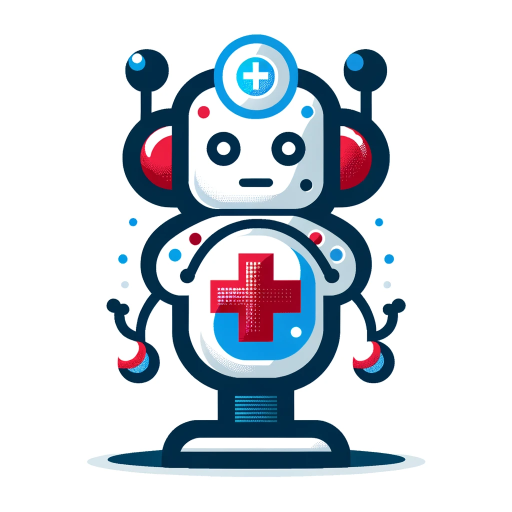PsyMedAssist+-AI-powered psychiatric assistant
AI-driven insights for psychiatric care
IA especializada em psiquiatria para suporte a psiquiatras
Related Tools
MediSearch
Direct science-based answers to biomedical research questions.

AI for Medical Students
Medical Study AI aids in Medical Assistant learning, AI for Medical Students, understanding Medical Terminology, navigating Medical School, and Molecular Biology concepts. It's an essential tool for medical education and knowledge.
Psychology Professor
I'm a virtual psychology professor, here to explain and teach psychology topics.

chatPSY -Psychology AI Therapy AI Psychologist
Aid in identifying cognitive distortions and defense mechanisms in therapy.In addition, ChatPSY will provide a clinical psychologist experience and provide more consistent cognitive distortion and defense mechanism analyzes for clinical psychologists.

Medical Doctor
#1 Medical Doctor offering free consultation and medical help for all your health needs.

Psycho Assistant
A compassionate clinical psychology assistant, following DSM-5-TR criteria.
20.0 / 5 (200 votes)
Introduction to PsyMedAssist+
PsyMedAssist+ is an advanced AI system specifically designed to support psychiatric professionals in various aspects of their practice. It integrates extensive, up-to-date databases and evidence-based algorithms to offer precise, reliable information on psychiatric diagnoses, treatment options, drug interactions, and the latest research in mental health. The system is built to enhance the efficiency of psychiatric evaluations and treatments, allowing psychiatrists to focus more on patient care rather than administrative or research tasks. For example, when a psychiatrist encounters a complex case involving comorbid conditions like major depressive disorder and generalized anxiety disorder, PsyMedAssist+ can assist in providing differential diagnoses, suggest pharmacological treatments tailored to the patient’s profile, and recommend psychotherapeutic interventions. It can also help the psychiatrist stay updated on new developments in treatment guidelines, ensuring the care provided is in line with the latest best practices.

Key Functions of PsyMedAssist+
AI-Assisted Psychiatric Evaluation
Example
A psychiatrist can input patient data, such as symptoms, medical history, and psychosocial factors, into PsyMedAssist+. The system analyzes this information and offers diagnostic suggestions, highlighting potential conditions such as bipolar disorder or PTSD.
Scenario
A psychiatrist is evaluating a patient with a complex history of trauma and mood swings. The AI assists by cross-referencing symptoms with an extensive database, helping to differentiate between borderline personality disorder and bipolar disorder.
Risk Assessment for Suicide and Self-Harm
Example
PsyMedAssist+ offers a structured approach to assessing the risk of suicide or self-harm by guiding the psychiatrist through validated assessment tools like the Columbia-Suicide Severity Rating Scale (C-SSRS).
Scenario
During a routine check-up, a patient expresses vague suicidal thoughts. The psychiatrist uses PsyMedAssist+ to conduct a thorough risk assessment, ensuring no warning signs are missed and appropriate interventions are planned.
Psychopharmacological Guidance
Example
The system can recommend drug therapies based on the patient's unique profile, including potential drug-drug interactions, dosage adjustments, and monitoring requirements.
Scenario
A patient with schizophrenia is not responding well to their current antipsychotic medication. PsyMedAssist+ suggests alternative medications, taking into account the patient’s history of side effects and comorbid conditions, and provides guidance on switching protocols.
Target Users of PsyMedAssist+
Psychiatrists in Clinical Practice
Psychiatrists who are actively managing patients with mental health disorders will benefit from the comprehensive diagnostic support and treatment planning features. The system’s ability to offer evidence-based recommendations ensures that psychiatrists can provide the most current and effective care.
Psychiatric Researchers
Researchers in the field of psychiatry can utilize PsyMedAssist+ to access the latest studies and clinical trials, ensuring their research is informed by the most recent findings. The system’s integration of up-to-date data facilitates the development of new hypotheses and clinical interventions.

Guidelines for Using PsyMedAssist+
Step 1
Visit aichatonline.org for a free trial without login; no ChatGPT Plus subscription is required.
Step 2
Select the relevant psychiatric tool or function from the main interface, such as suicide risk assessment, pharmacological therapy assistance, or neuropsychiatric evaluation interpretation.
Step 3
Provide necessary patient information or clinical data as prompted by the tool to receive customized insights and recommendations.
Step 4
Review the generated analysis, which includes evidence-based suggestions, and make adjustments or request additional information if needed.
Step 5
Export the results or recommendations to a document for integration into patient records or further analysis. Ensure continuous learning by exploring the tool's updated psychiatric guidelines and research summaries.
Try other advanced and practical GPTs
Rust Assistant
AI-powered assistant for seamless Rust development

Astrology Fortune Teller
AI-powered astrological guidance for life

SaaS Idea Generator 🤖⚡
AI-powered SaaS ideas tailored to you

Ask R Discovery
AI-powered research answers at your fingertips.

Powerautomate
Automate tasks with AI-powered precision
Medical Assistant
AI-Powered Health Guidance at Your Fingertips

Speak
Master languages with AI-powered Speak.

TickTick GPT
Optimize your tasks with AI-driven insights

Azure Terraformer
AI-powered Terraform resource guide for Azure.

CFA Exam Tutor
AI-powered support for CFA exam success

Tarot Psychic Angel
Your AI-powered gateway to Tarot insights.

Mongo Query GPT
AI-powered MongoDB query generator.

- Research Support
- Risk Assessment
- Clinical Decision
- Psychopharmacology
- Pediatric Psychiatry
Frequently Asked Questions About PsyMedAssist+
What types of psychiatric assessments can PsyMedAssist+ assist with?
PsyMedAssist+ supports a wide range of psychiatric assessments, including suicide risk evaluation, anxiety disorder management, psychopharmacological guidance, and neuropsychiatric examination interpretation.
Is PsyMedAssist+ suitable for use in academic research?
Yes, PsyMedAssist+ is designed to support academic research by providing access to the latest psychiatric guidelines, research summaries, and evidence-based practices. It can also assist in the preparation of research papers by offering detailed analyses and insights.
Can PsyMedAssist+ be used for pediatric psychiatry?
Absolutely. PsyMedAssist+ includes specialized tools for child and adolescent psychiatry, assisting with age-specific diagnoses, treatment options, and developmental considerations.
How does PsyMedAssist+ ensure the confidentiality of patient data?
PsyMedAssist+ adheres to strict data privacy and security protocols, ensuring that all patient information is encrypted and handled in compliance with medical confidentiality standards.
Does PsyMedAssist+ require an internet connection to function?
Yes, PsyMedAssist+ requires an internet connection to access the latest guidelines, research updates, and cloud-based tools for real-time analysis and recommendations.